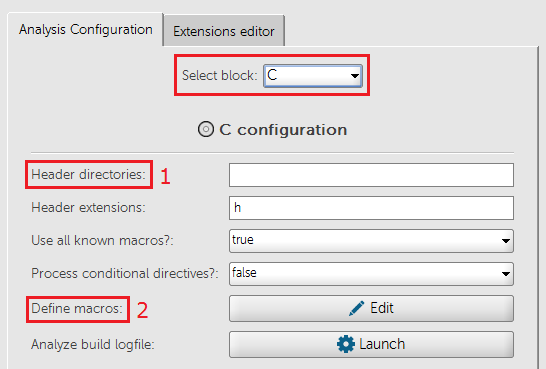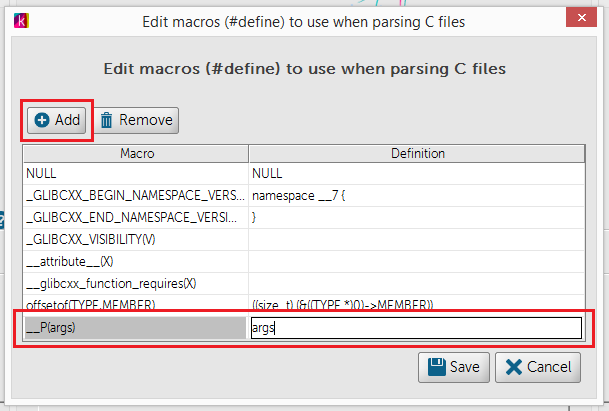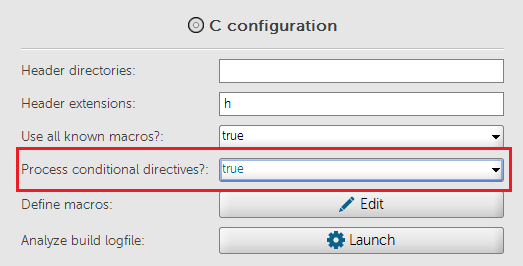Code Analysis with C/C++
The static analysis of C/C++ is a bit different from the analysis of other programming languages because the preprocessor complicates the analysis process a little bit. Resolving header files and macros, used in the preprocessing phase, is essential for a complete and correct C/C++ static code analysis. Let’s break down step by step how to analyze a C application with Kiuwan Code Security.
(Please note: some screenshots may be outdated)
Analyzing locally
Kiuwan Local Analyzer can be downloaded from the new analysis screen:
Or from your management drop-down menu:
Once the local analysis is complete, you can check the temp folder under Kiuwan Local Analyzer installation directory. You can find a new directory for this analysis. In our case: %KiuwanLocalAnalyzer%\temp\linux-ftpd.82232984
Here are the log files (certainly not very user-friendly) that help us to find the causes of parsing errors.
The file .unresolved.headers.log has the list of header files that were not found during the analysis. These files are not mandatory for a successful analysis, but they can help you to know where you have declared some macros that are subsequently used.
Our first parsing error.
Cannot parse C:\_dev\c\linux-ftpd-0.17\ftpd\extern.h, due to: Parse error at line 38, column 1. Encountered: void
line[38]: void blkfree __P((char **));
This error is due to the macro __P, which was not found during the analysis. This symbol is known as a parameter wrapper. It is a kind of macro, often used in sources that are meant to be compatible with pre-ANSI compilers to protect parameter declarations in function prototypes.
This macro, in our system, is located in /usr/include/x86_64-linux-gnu/sys/cdefs.h file, and is defined as:
#define __P(args) args
The sys/cdefs.h file was one of the listed in the log file c.unresolved.headers.log.
To solve this problem, we can edit the configuration for this application. On Kiuwan Local Analyzer’s ‘Analyze screen’, click on Configuration:
We have two options:
- Edit the ‘Header directories’ entry, where you can set a comma-separated directories list (absolute or relative to source directories), which includes files that could be found. This is a good option if you are analyzing in the same machine where the code is compiled and you have access to all source code dependencies.
- Go to the ‘Macro definition section’, and click on Edit. On the new screen, you can define this new macro:
In both cases, this configuration is saved for subsequent analyses, so the configuration is a ‘one-time’ action.
Let’s go to the second error.
Once one error is fixed, we need to analyze it again, since some errors are hidden or caused by another one. In the new log file, after the second analysis, we get:
Cannot parse C:\_dev\c\linux-ftpd-0.17\ftpd\ftpd.c, due to: Parse error at line 1644, column 1. Encountered: reply
line[1644]: reply(int n, char *fmt, va_dcl va_alist)
Seeing the code, around line 1644, we find:
#ifdef __STDC__
reply(int n, const char *fmt, …)
#else
reply(int n, char *fmt, va_dcl va_alist)
#endif
Our analyzer does not support the LEGACY mode to handle variable argument lists used in va_dcl va_alist.
To skip this definition, we can define the macro __STDC__, with value 1, as seen before, and ask KIUWAN to process the preprocessor conditional directives.
After this last change all files were processed, so we have finished our work.
Conclusion
In short, when we have problems in our C analysis:
- Analyze locally: Local Kiuwan Analyzer
- Resolve parsing errors whose origin is due to configuration problems:
- Review unresolved.headers.log
- Include Header directories
- Define macros
- Whether we need to process conditional directives





